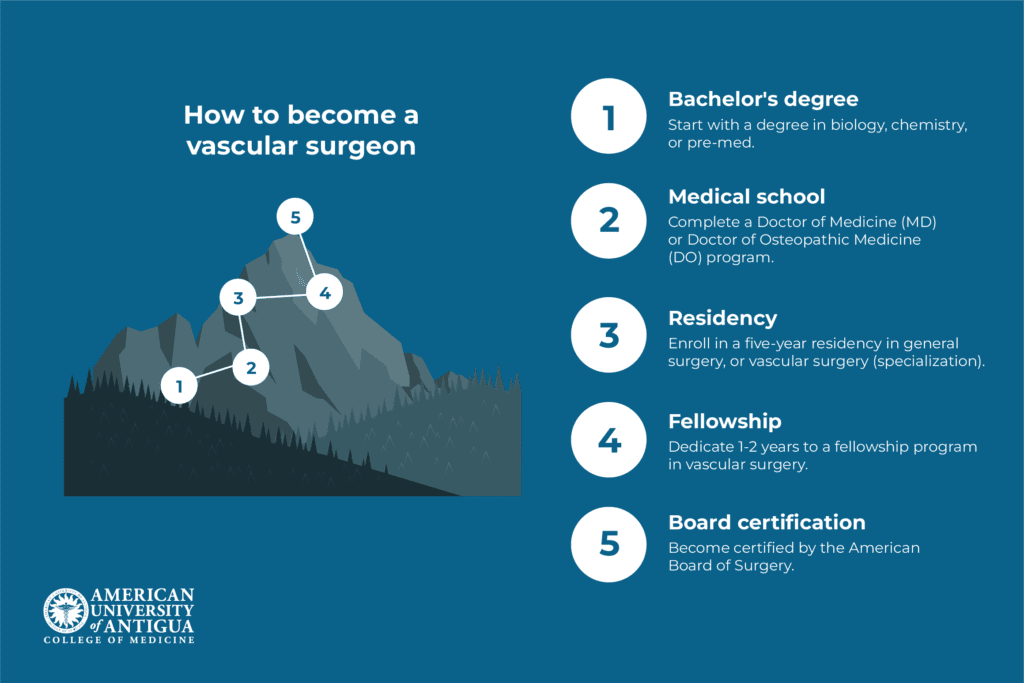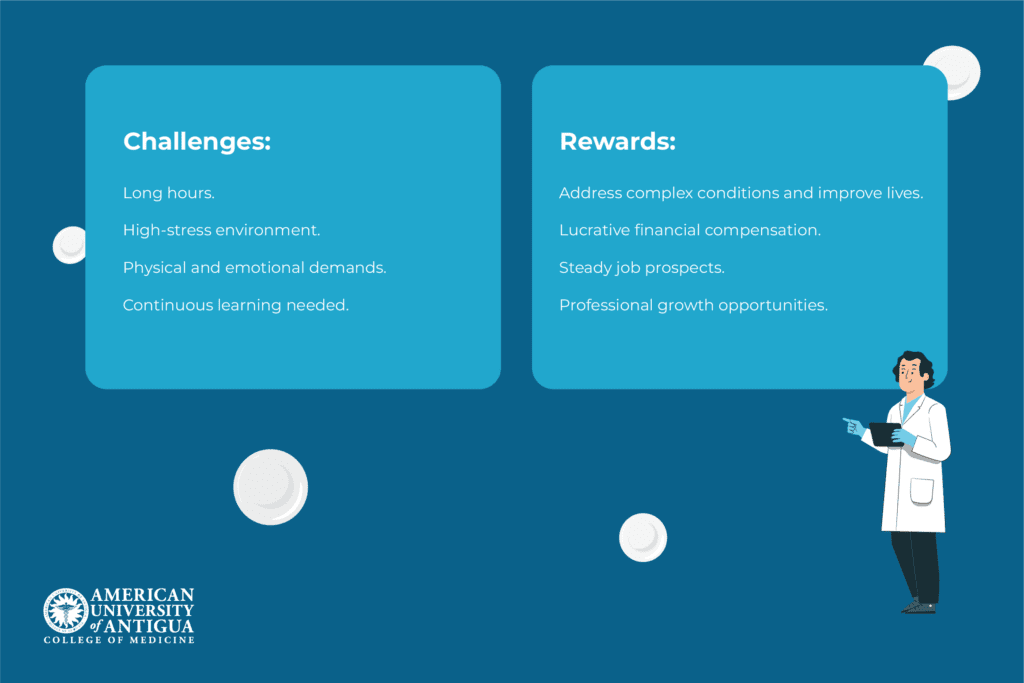How to Become a Vascular Surgeon: Education and Skills
- Becoming a vascular surgeon requires a bachelor’s degree, medical school, general surgery residency, and a vascular surgery fellowship.
- Success in vascular surgery demands technical expertise, decision-making abilities, and emotional resilience.
- The growing aging population ensures increasing opportunities for vascular surgeons, offering job stability and financial rewards.
- While the career demands long hours and high stress, the ability to make a real difference in patients’ lives is a major reward.
With many types of surgery options available, vascular surgery stands out for its unique role in healthcare. This challenging but highly rewarding career blends medicine and complex surgeries for meaningful impact. And if you’re wondering how to become a vascular surgeon, the journey involves several years of education and specialized training.
From earning a bachelor’s degree to completing medical school and residency, each step is crucial in developing the expertise needed to become a vascular surgeon. In this blog post, we’ll guide you through the educational requirements, essential skills, and what it takes to succeed in this dynamic field.
✅ Request information on AUA's MD program TODAY!
YOUR PATH TO SUCCESS BEGINS HERE
What Does a Vascular Surgeon Do?
Vascular surgeons are specialists trained to diagnose, manage, and treat disorders of the vascular system, which includes arteries, veins, and lymphatic vessels. Their primary role is to perform surgeries and medical procedures to address issues such as:
- Blocked arteries
- Aneurysms
- Varicose veins
- Blood clots in arteries or veins
- Lymphedema (swelling due to lymphatic blockage)
To restore proper blood flow, these surgeons use advanced techniques, including open surgery and minimally invasive methods like angioplasty or stenting. Beyond surgeries, vascular surgeons have important non-surgical responsibilities:
- They diagnose vascular diseases by assessing symptoms, reviewing medical histories, and using imaging tests like ultrasounds or MRIs.
- They develop personalized treatment plans, which may include lifestyle changes, medications, or procedures.
- They manage ongoing patient care, ensuring treatments are effective and addressing any complications.
In essence, vascular surgeons combine technical expertise with patient-centered care to enhance lives by addressing conditions of the vascular system.
Educational Requirements to Become a Vascular Surgeon

Becoming a vascular surgeon is a rewarding journey for individuals passionate about improving patients’ health through specialized care. Here’s a step-by-step guide on how to become a vascular surgeon:
- Earn a bachelor’s degree: Start with a degree in biology, chemistry, or pre-med to build a strong foundation in science and meet medical school prerequisites.
- Attend medical school: Complete a Doctor of Medicine (MD) or Doctor of Osteopathic Medicine (DO) program, typically lasting four years. This involves studying anatomy, pharmacology, and pathology while gaining hands-on clinical experience.
- Complete residency: Enroll in a five-year residency in general surgery to gain practical experience in surgical procedures and patient care, laying the groundwork for advanced specialization.
- Pursue a fellowship: After residency, dedicate 1-2 years to mastering vascular surgery techniques and managing complex cases during a fellowship program in vascular surgery.
- Obtain board certification: Become certified by the American Board of Surgery by passing the required examinations. This certification demonstrates your expertise and commitment to maintaining the highest standards in the field.
This rigorous path equips aspiring vascular surgeons with the skills and expertise needed to excel in their field, combining technical proficiency with compassionate care.
Key Skills Required to Become a Vascular Surgeon
Aspiring vascular surgeons need a diverse set of skills to succeed in this challenging field. This includes:
- Technical skills: Proficiency in using surgical tools and performing complex procedures with precision is necessary for success.
- Decision-making skills: Quick, confident decisions are important, especially during surgeries or when unexpected complications arise.
- Communication skills: Clear communication with patients, families, and medical teams ensures effective care and builds up trust.
- Stamina and physical endurance: Surgeries can be long and physically demanding, requiring the ability to stay focused and energetic for extended periods.
- Attention to detail: A meticulous approach is vital for accuracy in diagnosing and treating delicate vascular conditions.
These skills, combined with continuous learning, help vascular surgeons provide exceptional care and achieve optimal patient outcomes.
Certifications and Licensing for Vascular Surgeons
Licensing and certification are critical steps that establish credibility and allow vascular surgeons to provide high-quality care in their field.
To practice medicine, vascular surgeons must obtain a medical license in their state or country, which typically requires passing a licensing exam such as the USMLE in the United States. Licensing confirms that a doctor meets the basic standards for medical practice.
After completing a general surgery residency, aspiring vascular surgeons often pursue board certification in general surgery from the American Board of Surgery or its equivalent in other countries. This certification demonstrates advanced knowledge and competence in general surgical procedures.
Following a vascular surgery fellowship, surgeons can seek board certification in vascular surgery, also from the American Board of Surgery. This specialized certification highlights expertise in diagnosing and treating vascular conditions.
Salary and Career Outlook for Vascular Surgeons
A career as a vascular surgeon is both rewarding and financially appealing, which makes vascular surgery worth considering if you’re a student seeking a medical role for your career. This and the chance to offer life-saving services make this field worthwhile.
The estimated annual pay for vascular surgeons in the United States is $438,255, which is highly admirable. Factors like years of experience, location, and workplace—whether in hospitals, private practices, or academic institutions—can significantly influence earnings.
Similarly, the career outlook for vascular surgeons is promising. As the population ages, the need for specialists who can treat vascular conditions such as blocked arteries, aneurysms, and other blood vessel issues is increasing. This growing demand ensures a steady flow of opportunities for new vascular surgeons.
According to the U.S. Bureau of Labor Statistics, the demand for physicians and surgeons, including vascular specialists, is projected to grow in the coming years. Vascular surgery is therefore a desirable career path for aspiring medical professionals due to its high earning potential, job stability, and opportunity to significantly impact patients’ lives.
Challenges and Rewards of Being a Vascular Surgeon

A career in vascular surgery is demanding, with the key challenges being:
- Long hours: Vascular surgeons often work irregular schedules, including nights and weekends, especially during emergencies.
- High-stress environment: The pressure of making life-saving decisions and managing critical cases can create a stressful work environment.
- Physical and emotional demands: Long surgeries require stamina; supporting patients and families through tough times can be emotionally taxing.
- Continuous learning: It is necessary to stay up to date with medical technology and procedures, which requires constant learning and flexibility.
Despite the challenges, this field offers significant rewards, making it a fulfilling career path. Here’s why this field is rewarding:
- Making a difference: Vascular surgeons improve patients’ lives, addressing complex conditions and restoring health.
- Financial compensation: The field offers a competitive salary that reflects the high level of skill and commitment required.
- Job stability: With a growing demand for specialists, vascular surgeons enjoy strong job security.
- Professional growth: Opportunities to learn new techniques and use advanced technologies allow for continuous career advancement.
These challenges and rewards create a dynamic and impactful career for those passionate about medicine and patient care.
Is Vascular Surgery the Right Career Path for You?
When everything is taken into account, such as the financial benefits and employment opportunities in vascular surgery, students frequently question whether this is the right career path. While vascular surgery is a highly beneficial role, it all boils down to one’s preferences and career aspirations.
Choosing vascular surgery as a career requires passion, resilience, and dedication. If you’re deeply interested in medicine and fascinated by the intricacies of treating complex vascular conditions, this field could be a great fit. Success in vascular surgery also demands comfort with the physical demands of performing detailed, often lengthy procedures.
A commitment to continuous learning is essential. Medical advancements in this rapidly evolving field mean you’ll need to stay updated with new techniques and technologies throughout your career. This lifelong learning process is both challenging and rewarding for those who enjoy intellectual growth.
Vascular surgeons must also thrive in high-pressure situations. The ability to remain calm and make critical decisions during emergencies is vital. Be prepared for long working hours and the emotional challenges of dealing with serious health issues.
If you’re ready to embrace these demands while making a profound difference in patients’ lives, vascular surgery might be the perfect career path for you.
Conclusion
Vascular surgery offers a challenging yet rewarding career for surgery enthusiasts. This field requires strong technical skills, resilience, and a commitment to continuous learning. While it comes with physical demands, long hours, and high-pressure situations, the rewards—making a meaningful difference, job stability, professional growth, and financial benefits—make it deeply fulfilling.
If you’re ready to take on these challenges and embark on a journey that combines technical expertise with compassionate care, vascular surgery could be your ideal path. Start your journey today by exploring the medical school program at AUAMED and taking the first step toward this impactful career!
Frequently Asked Questions (FAQs):
How long does it take to become a vascular surgeon?
Becoming a vascular surgeon typically takes about 13–14 years, including medical school, a general surgery residency, and a vascular surgery fellowship.
What are the differences between a vascular surgeon and a cardiologist?
Vascular surgeons specialize in diseases of the blood vessels, while cardiologists focus on the heart and its related conditions.
Can a vascular surgeon specialize in specific types of surgery?
Yes, a vascular surgeon can specialize in specific types of surgery, such as endovascular procedures or complex arterial surgeries.
✅ Request information on AUA's MD program TODAY!
YOUR PATH TO SUCCESS BEGINS HERE
✅ Request information on AUA's MD program TODAY!